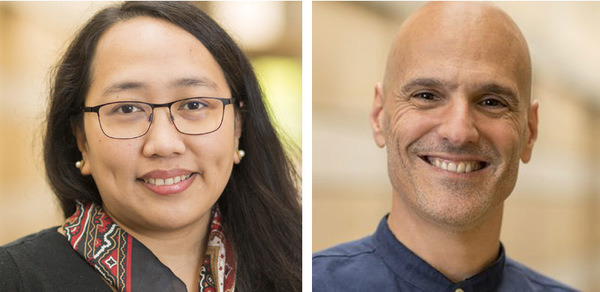
The Klau Center is co-funding a new initiative focused on human rights reparations and compliance with an eye toward influencing policy and practice internationally
Jointly supported by the Klau Center and the Kellogg Institute for International Studies, the Notre Dame Reparations Design and Compliance Lab is one of four Policy and Practice Research Labs begun by Kellogg to support high-impact, high-yield research intended to have a tangible influence on policies and practices affecting democracy and human development.
“We want to produce something that will make a difference in the way that policymakers act, in addition to generating the peer-reviewed books and articles that advance academic exchange,” Kellogg Institute Director Paolo Carozza said about the labs.
The Notre Dame Reparations Design and Compliance Lab is led by Diane Desierto and Aníbal Pérez-Liñán, faculty fellows of both the Kellogg Institute and the Klau Center. The Reparations Lab asks: Under what conditions do states comply with orders of international tribunals in cases involving human rights? The project will analyze, from an interdisciplinary perspective, issues surrounding current compliance as well as the future design of human rights reparations measures.
Desierto is an associate professor of human rights law and global affairs at the Keough School who specializes in international law, and Pérez-Liñán is a professor of political science and global affairs who studies democratization. He holds a joint appointment in the Department of Political Science and the Keough School. Pérez-Liñán noted that the labs “offer a unique environment to integrate the work of faculty, undergraduates, law, Master of Global Affairs students, and doctoral candidates.”
Additional Kellogg Institute Policy and Practice Research Labs include the Integral Human Development Research Lab, led by Faculty Fellows Clemens Sedmak and Emmanuel Katongole, the Initiative on International Economic Integration, led by Faculty Fellow Jeff Bergstrand, and The Notre Dame Transitional Justice Lab, led by Faculty Fellow Guillermo Trejo.
Carozza noted the relevance of the initiatives, which address the Kellogg Institute’s core research themes of democracy and human development.
“All of them are responding to very concrete, timely, urgent problems and issues,” he said. “All of them, in addressing these issues, are doing so in ways that creatively use sophisticated social science research methods.”
“If they’re successful,” he added, “then they’re going to be changing the field. Not just the way we talk about the field in our scholarly work, but the underlying reality of the field itself.”
The lab program’s goal of influencing policy supports the mandate of the Keough School, the parent institution of both Klau and Kellogg at the University of Notre Dame. Founded in 2014, the Keough School promotes integral human development through research and global engagement.
Carozza said that as Kellogg’s role within the Keough School has become more defined, “the labs seemed like a natural and fitting way to achieve our goal of producing faculty work that will impact policy.”
The Policy and Practice Research Labs are led by one or two faculty fellows and are targeted in their focus to intentionally bridge the worlds of research and policy while maintaining a focus on rigorous scholarly inquiry.
“They go a step beyond basic research by disseminating knowledge to end users outside of the academic arena and partnering with international actors to help improve practices,” Carozza said.
“The nature of the research questions they were asking lent itself to a different kind of output and impact,” he said.
The Klau Center contributed to this story, originally published by the Kellogg Institute for International Studies.